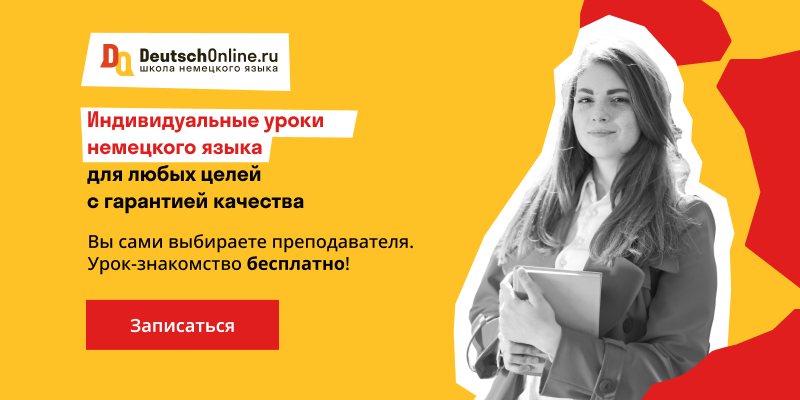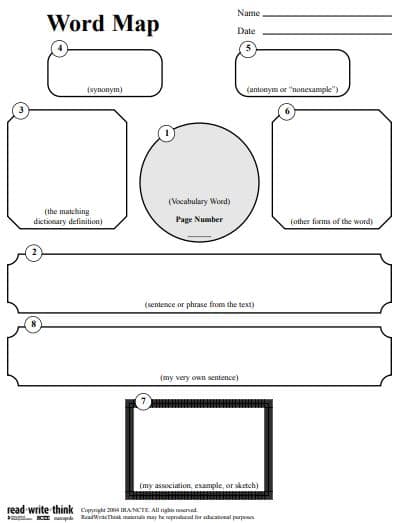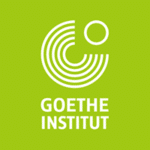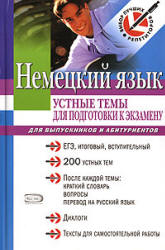Укажите регион, чтобы мы точнее рассчитали условия доставки
Начните вводить название города, страны, индекс, а мы подскажем
Например:
Москва,
Санкт-Петербург,
Новосибирск,
Екатеринбург,
Нижний Новгород,
Краснодар,
Челябинск,
Кемерово,
Тюмень,
Красноярск,
Казань,
Пермь,
Ростов-на-Дону,
Самара,
Омск
Как подготовиться к говорению на экзамене по немецкому языку? Из каких заданий состоит устная часть экзамена Goethe Zertifikat для уровня B1? Для того, чтобы вы могли успешно сдать экзамен по немецкому языку уровня B1, мы попросили нашего преподавателя составить примерный список полезных выражений, а также дать советы тем, кто хочет подготовиться самостоятельно.
Перед тем, как приступить к изучению иностранного языка, в первую очередь, важно определиться с целью, которая будет с вами в процессе обучения и придаст мотивацию. Говоря о своём опыте, целью большинства моих учеников является сдача международного экзамена по немецкому языку. И, конечно, для многих это необходимо для переезда в Германию или же поездки с образовательной целью, например, участия в курсах или стажировках.
Если мы говорим о международных экзаменах по немецкому, то их количество не ограничивается одним или даже двумя. В список входят уже многим известные экзамены как TestDaF, DSH, TELC и, конечно же, Goethe Zertifikat. Если первые два экзамена в основном предназначены для поступления в немецкий вуз, то Goethe Zertifikat очень многообразен и часто необходим для сдачи тем ученикам, которые хотят переехать жить в Германию или другую немецкоязычную страну. О странах, в которых говорят на немецком, мы писали ранее.
Среди моих учеников есть два очень способных ученика, которые занимаются уже больше года дуэтом. На данный момент они уже завершают уровень B1.1, учитывая, что начали с нуля. Их целью является сдача Goethe Zertifikat B1, но конкретной части – Sprechen, и они уже почти у цели. К слову, именно часть Sprechen является самой распространенной проблемой у всех, кто стремиться сдать экзамен.
Советы по подготовке к устной части экзамена Goethe Zertifikat B1
- Грамотное построение речи — это то, что требуется от вас на этой части экзамена. Поверьте, если экзаменатор задаёт вам вдруг какой-то вопрос, это не потому что, ему очень хочется что-то узнать по этому поводу, а потому что ему нужно услышать, как вы можете выразить мысль на немецком.
- Аудио- и видеоматериалы слушать необходимо минимум 60 минут каждый день, отводить этому большое количество времени. Советую к просмотру следующие материалы: Mein Weg nach Deutschland, Jojo sucht das Glück, Nicos Weg, Easy German, Langsam gesprochene Nachrichten.
- Найдите кого-то, с кем сможете поговорить хотя бы полчаса в день. Очень хорошо помогут индивидуальные занятия, например, 45 минут в день, чтобы вести дискуссии с преподавателем, который заодно исправит ваши ошибки.
- При просмотре видео или прослушивании аудио обязательно делайте записи в тетради, а затем перескажите самому себе или же кому-то другому, о чем шла речь.
- Обязательно помните о шаблонных выражениях, клише, вводных конструкциях, которые украсят вашу речь. Об этом будет ниже.
СТРУКТУРА УСТНОЙ ЧАСТИ ЭКЗАМЕНА
Aufgabe 1. Gemeinsam etwas planen
В этом задании нужно спланировать какую-либо встречу с вашим собеседником на экзамене. Если опираться на пример тренировочного варианта с сайта Goethe Institut, ситуация может быть следующей: вы и ваш собеседник выиграли в конкурсе недельный языковой курс в Кельне, и вам необходимо распланировать поездку. Однако ситуации могут быть различными: спланировать переезд, поход в гости, на день рождения и т.д.
Выражения, которые могут помочь:
- Kannst du am…
- Wann können wir uns treffen?
- Passt dir am… um…?
- Sollen wir…?
- Wie findest du…?
- Vielleicht könnten wir…?
- Könntest du…
- Das ist eine gute Idee!
- Ja, das finde ich gut!
- Es tut mir leid, aber…
Попробуем составить диалог по первому заданию из тренировочного теста:
— Hallo Otto. Wie geht es dir?
— Hallo Olga. Es geht mir gut. Und dir?
— Prima. Ich habe die E-Mail bekommen, dass wir einen einwöchigen Sprachkurs in Köln gewonnen haben. — Ach so? Wirklich? Ich habe noch keine E-Mails gelesen. Das ist so toll!
— Ja, genau, und wir sollen unsere Reise besprechen. Wann treffen wir uns am Flughafen? Der Flug ist am Freitag um 16:15 Uhr.
— Vielleicht könnten wir uns dann um 14:00 am Flughafen treffen und zusammen gehen?
— Sehr gut. Ich stimme zu. Möchtest du zum Flughafen mit dem Taxi fahren?
— Nein, mein Vater kann uns dorthin fahren. Willst du mit uns fahren?
— Danke, gerne. Ich werde sie am Freitag Mittag erwarten.
— Wo sollen wir in Köln wohnen?
— Ich denke, wir müssen das Hotelzimmer buchen.
— Ich versuche schon heute die Zimmer in einem guten Hotel online buchen.
— Schön. Möchtest du noch etwas besprechen?
— Ich will dich auch fragen, was möchtest du mitnehmen?
— Für einwöchige Reise nehme ich gern notwendige Kleidung, einen Regenschirm und natürlich Körperpflegemittel. — Richtig, ich muss auch Pflegemittel mitnehmen, aber nicht viel, es gibt alles im Hotel.
— Super. Dann rufe ich dich am Freitag Mittag an.
— Gut, bis bald.
— Tschüs.
Aufgabe 2. Ein Thema präsentieren
Второе задание считается самым сложным заданием всей части Sprechen B1. В задании даны две темы на выбор в форме презентации. Вы должны выбрать одну и раскрыть по следующему плану:
- представьте тему. Расскажите о содержании вашей презентации и о структуре,
- расскажите о своем личном опыте в рамках данной темы,
- поделитесь ситуацией в вашей стране,
- приведите плюсы и минусы, а также выразите своё мнение,
- завершите презентацию и поблагодарите.
На каждом слайде написано, что вы должны рассказать, а перед каждым слайдом даны подсказки, как вы должны вести выступление.
Полезные выражения для этого задания:
- Meine Präsentation heißt …
- In meiner Präsentation gibt es folgende Teile:
- Zuerst erzähle ich gern über meine Erfahrungen.
- Dann erzähle ich über die Situation in meinem Heimatland.
- Dazu beschreibe ich einige Vorteile und Nachteile.
- Zusammenfassend vertrete ich meine eigene Meinung.
- Ich denke/glaube…
- Ich habe niemals/oft…
- In meinem Heimatland ist die Situation so:…
- Ich bin sicher, dass…
- Zum Schluss möchte ich noch sagen, dass …
- Vielen Dank für Ihre Aufmerksamkeit!
- Einerseits ist …
- Andererseits ist …
- Als Nachteil/Vorteil kann man sagen …
Готовитесь к переезду в Германию? Нужно сдать экзамен на знание немецкого языка? В Deutsch Online вы можете записаться на индивидуальные занятия немецким языком с сертифицированными преподавателями. Наши менеджеры помогут подобрать того, кто подойдет именно вам, и уже с первых занятий вы начнете строить путь к своим целям. Запишитесь прямо сейчас, первый урок-знакомство — бесплатно!
Записаться на урок немецкого языка с репетитором
В тренировочном тесте дана тема «Свадьба – большой праздник или скромное мероприятие?». Попробуем составить текст.
Sehr geehrte Damen und Herren, meine Präsentation heißt «Hochzeit – großes Fest oder private Feier?» In meiner Präsentation gibt es folgende Teile:
Zuerst erzähle ich gern über meine Erfahrungen.
Dann erzähle ich über die Situation in meinem Heimatland.
Dazu beschreibe ich einige Vorteile und Nachteile.
Zusammenfassend vertrete ich meine eigene Meinung.
Ich denke, die Hochzeit ist ein sehr wichtiges Ereignis im Leben der Menschen. In meiner Familie ist es ganz wichtig, ein großes Fest zu machen und viele Gäste einzuladen.
In Russland ist die Situation so, dass viele Frauen ein großes und schönes Fest möchten, und versuchen ihre Hochzeit perfekt zu organisieren. Vielleicht geht es bei den Männern nicht so und das kann man verstehen. Aber auch ist es ganz normal für die Menschen, eine kleine Feier mit den Familienmitgliedern zu machen. Ich komme aus Russland, aber habe orientalische Erziehung und kann auch dazu sagen, dass die Meinung der Eltern auch große Rolle spielt. Als Nachteil kann man sagen, dass großes Fest sehr teuer ist und nicht alle sich leisten können. Aber natürlich gibt es mehr Vorteile. Man feiert die Hochzeit mit vielen Verwandten und Freunden, bekommt Geschenke, macht viele Fotos und Videos. Ich denke, die Hochzeit soll sein.
Zusammenfassend möchte ich sagen, dass jeder entscheidet selbst, ob es großes Fest oder private Feier sein soll. Vielen Dank für Ihre Aufmerksamkeit. Ich beantworte gerne Ihre Fragen.
Больше текстов на немецком языке на различные тематики вы можете найти в специальном разделе на нашем сайте
Aufgabe 3. Über ein Thema sprechen
Третье задание связано со вторым. В данном задании вам нужно отреагировать на выступление вашего собеседника, поблагодарить и задать вопросы.
Выражения, которые можно использовать:
- Vielen Dank für Ihre Präsentation!
- Ich glaube…
- Ich möchte fragen: …
Принимая во внимание все правила заданий, а также выучив важные выражения, можно на шаг ближе подойти к сдаче устной части экзамена. Самое главное — правильно рассчитывать время на самом экзамене и не отводить его на черновик, а сразу готовиться к выступлению. Успехов!
Материал готовила
Анжелика Карапетова, преподаватель Deutsch Online

Самые популярные
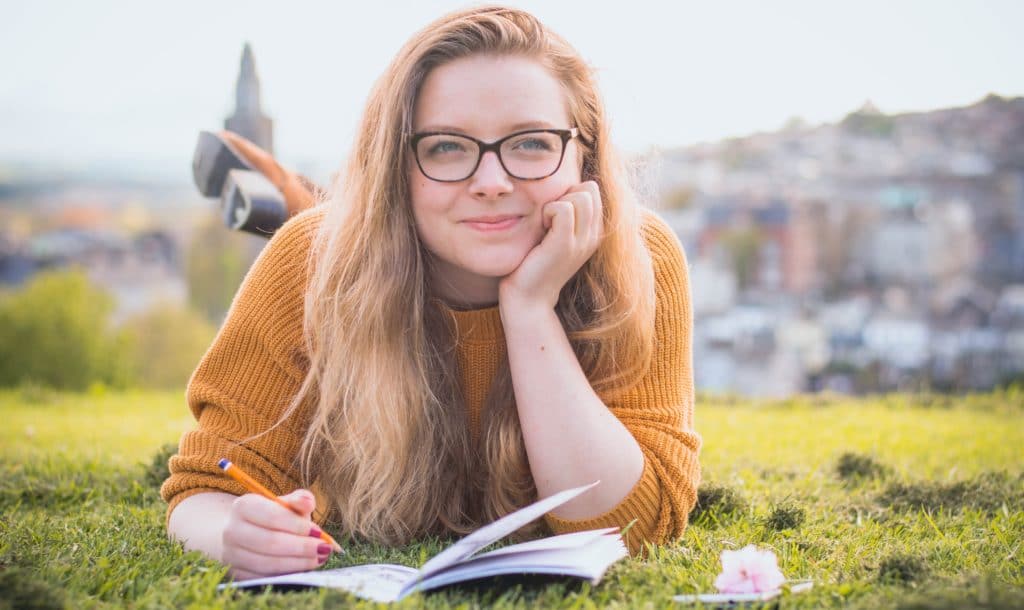
By
Last updated:
February 21, 2022
Ae you about to take a German oral exam?
You can get prepared with this bank of 59 ready-to-use German oral exam phrases.
Study these, and you can calmly handle any topic your examiner throws at you.
Contents
- How to Prepare for a German Oral Exam
-
- Familiarize Yourself with the Format of the Exam
- Memorize Words Smarter with Word Maps
- Practice in the Mirror
- Watch and Listen to Native Speakers
- 59 Ready-to-use Phrases to Ace Your German Oral Exam
-
- Introduction Phrases and Questions
-
- Talking About Yourself
- Asking About Someone Else
- Phrases and Questions for Shopping
- Phrases and Questions to Ask for Help
- Expressing and Asking for Opinions
- Giving a Mini-presentation
-
- Opening Phrases
- Main Points
- Concluding Phrases
- Important Grammatical Structures for a Smooth German Oral Exam
-
- Partizip 2 (Present Perfect Tense)
- Modalverben (Modal Verbs)
- Trennbare Verben (Separable Verbs)
- Konnektoren (Connectors)
Download:
This blog post is available as a convenient and portable PDF that you
can take anywhere.
Click here to get a copy. (Download)
How to Prepare for a German Oral Exam
Familiarize Yourself with the Format of the Exam
This is the first step to ensuring that you’ll be calm and confident on test day. You’ll know what to expect, how to present yourself and, most importantly, your preparation will be focused and relevant.
If you’re taking an oral exam in an academic setting, your teacher or professor will likely explain the scope of the test, even if it’s just the basics. When you’re studying, be sure to adhere to that structure—time yourself, discuss certain topics in the order your professor specified, leave your notes somewhere hard to reach—anything to imitate what you’ll actually be experiencing on test day.
With official German language tests, you may need to do a little bit of research to know the test structure. However, it’ll be easy to find.
For example, there’s tons of information about the popular Goethe Zertifikat exam online. You’ll see that the A1 (beginner) level exam has a basic question-and-answer format, and you’ll need to speak for about 15 minutes. However, the C2 (advanced) level exam requires you to deliver a presentation and respond to counterarguments, also within 15 minutes.
Memorize Words Smarter with Word Maps
Once you know the format of the test, you’ll know what vocabulary topics would be best for you to study. Word maps are an incredible tool to avoid those long, uncomfortable pauses while speaking.
That’s because word maps make it easy to memorize a lot of related words at once. That way, you can be fully prepared for any topic you need to discuss in your German oral exam and handle anything that’s thrown at you during the test.
They’ll also help you get more use out of the phrases you’ll be preparing to use in your oral exam. If you have a wide range of nouns, verbs and adjectives to work with, you can easily swap them in and out of your German phrases, adapting them to specific situations.
The beauty of this technique is that you can be creative within a framework. Check out my examples below, where you’ll see that I’ve organized words both by theme (work) and part of speech.
Verbs:
- verdienen (to earn)
- ausgeben (to spend)
- sparen (to save)
- ausgleichen (to balance)
Nouns:
- die Motivation (motivation)
- das Engagement (dedication)
- das Berufsleben (work life)
- die Berufswelt (vocational world)
- das Gehalt (salary)
Adjectives:
- wenig (little)
- viel (a lot)
Particles:
- nur (only)
- erst (first)
- noch (still)
With the above word list, I can churn out the following sentence, for example:
Ich verdiene viel, weil mein Gehalt hoch ist. Aber ich gebe auch viel aus. Manchmal denke ich, dass ich wenig verdiene. Aber das Problem ist, dass ich nicht viel spare. (I earn a lot, because my salary is high. But I also spend a lot. Sometimes I think that I earn less. But the problem is that I don’t save a lot.)
Practice in the Mirror
Success in a German oral exam isn’t just about the words and phrases you use. It’s also about your body language, eye contact and overall demeanor. These are key aspects of your speaking skills.
That’s why it’s important to practice speaking German in front of a mirror. Here’s what to look for:
- A confident posture, sitting up straight but calm and relaxed.
- Hands folded on your lap, not in your pockets.
- Eye contact with the examiner. Eye contact is a big deal in general in German culture, and more so in German oral exams. Not looking at the examiner and speaking while looking down is considered a mark of low self-confidence.
Watch and Listen to Native Speakers
When practicing for the exam, listening to native speakers can continually improve your skills. You can listen to the phrases you’ll find here in action by looking for them on audio resources like YouTube and podcasts, as well as learning programs like FluentU.
For instance, if you search for any of these phrases on FluentU, you’ll get to see them being used in context through authentic videos like movie clips and interesting talks.
You can also use the interactive subtitles to check what any word in a video means, then take some quizzes to test your skills—you can even speak the answers to these quizzes for some additional speaking practice.
The more you listen to and practice your phrases, the more easily they’ll come to you when you’re speaking.
59 Ready-to-use Phrases to Ace Your German Oral Exam
I personally consider Steve Jobs to be one of the greatest oral speakers. His key tip was: rehearse, rehearse and rehearse—with the phrases you want to use in your presentation.
This made me think to myself, “hey, why don’t I create a phrase bank to prepare for German oral exams?”
Here are some of my phrase banks for German oral exams, grouped by category. We’ve based these categories largely on the Goethe Zertifikat oral exam rubrics, but you can mix, match and adapt them to any exam you’re planning to take. They’ll give you the ready-to-use phrases you need to ace your test!
Introduction Phrases and Questions
Talking About Yourself
Ich heiße…/Ich bin… (My name is…/I am…)
Ich komme aus… (I come from…)
Ich wohne in… (I live in…)
Ich bin _____ Jahre alt. (I am _____ years old.)
Meine Hobbys sind… (My hobbies are…)
Asking About Someone Else
Was machst du/machen Sie bei der Arbeit? (What do you do at work?)
Was machen Sie/machst du beruflich? (What do you do professionally?)
Was machst du/machen Sie in der Freizeit? (What do you do in your free time?)
Wann haben Sie/hast du frei? (When do you have free time?)
Phrases and Questions for Shopping
For many beginner and lower-intermediate German oral exams, you’ll need to demonstrate that you can get by in daily German life. You may be asked to role-play a conversation in a store or some other German public place. These questions and phrases will help.
For the most part you should avoid using the du form in this context, as you would want to speak respectfully and formally with strangers.
Wieviel kostet _____?/Was kostet _____? (How much does _____ cost?)
Wo kaufen/bekommen Sie…? (Where do you buy/get…?)
Wie sind Ihre/deine Arbeitszeiten? (What are your working hours?)
Wann schließt _____? (When does _____ close?)
Wann öffnet die Bäckerei/der Supermarkt/die Apotheke _____? (When does the bakery/supermarket/pharmacy open?)
Ich hätte gern/Ich möchte… (I would like…)
Phrases and Questions to Ask for Help
Ich hatte eine Frage. (I had a question/inquiry.)
Könnten Sie/ könntest du bitte mir helfen? (Could you please help me?)
Könnten Sie/ könntest du bitte mir eine/einen _____ geben? (Could you please give me a _____?)
Könnten Sie mir sagen… (Could you tell me…)
Ich möchte wissen, ob… (I would like to know whether…)
Vielen Dank für die Informationen/Hilfe. (Thanks a lot for the information/help.)
Expressing and Asking for Opinions
Was denkst du/denken Sie? (What do you think?)
Meiner Meinung nach… (In my opinion…)
Ich finde, dass… (I find that…)
Ich denke, dass… (I think that…)
Hast du/Haben Sie etwas dazu zu sagen? (Do you have something to say about that?)
Wie meinst du/meinen Sie? (What do you feel?)
Giving a Mini-presentation
At the intermediate stages and up, you’ll need to prove that you can discuss a topic coherently, support your opinions and address counterarguments. The Goethe Zertifikat B1 exam, for example, requires a brief presentation about an everyday topic.
Opening Phrases
Guten Tag, meine Damen und Herren. (Hello, ladies and gentlemen.)
Mein heutiges Thema ist… (Today my topic is…)
Ich spreche über dieses Thema, weil… (I am speaking about this topic because…)
Main Points
Ich möchte über die folgenden Punkte sprechen… (I would like to speak about the following points…)
Erstens/zweitens/drittens werde ich über _____ sprechen. (First/second/third I will be talking about _____.)
Concluding Phrases
Ich möchte kurz zusammenfassen. (I would like to shortly conclude.)
Abschließend möchte ich sagen, dass… (In conclusion I would like to say that…)
Vielen Dank für die Aufmerksamkeit. (Thank you for the attention.)
Haben Sie Fragen? (Do you have any questions?)
Important Grammatical Structures for a Smooth German Oral Exam
Partizip 2 (Present Perfect Tense)
This tense is particularly useful for question-framing. Of course to use this tense, just be sure you’re familiar with your German participles.
Haben Sie schon etwas gegessen? (Have you eaten something already?)
Wie sind Sie/bist du nach London gefahren? (How did you travel to London?)
Wann hast du Deutsch gelernt? (When did you learn German?)
Modalverben (Modal Verbs)
German modal verbs are quite handy to use in question-framing or expressing wants, abilities, permissions, etc.:
Könn(t)en Sie Bitte…. (Could/Can you please…)
Ich wollte eigentlich… (I actually wanted to…)
Darf ich…? (May I…?)
Trennbare Verben (Separable Verbs)
Many German oral exams will ask you to make plans or negotiate with another German speaker, to demonstrate flexible conversation skills. Separable verbs are very useful here.
Kommst du am Freitag um 7 Uhr mit? (Are you coming along on Friday at 7 o’clock?)
Was bringst du zur Party mit? (What are you bringing along to the party?)
Um wie viel Uhr muss ich dich abholen? (At what time must I pick you up?)
Was ziehst du heute an? (What are you wearing today?)
Das sieht gut aus. (That looks good.)
Konnektoren (Connectors)
These work well in expressing opinions, thoughts, conditions and situations.
weil (because):
Remember to place the verb in the second clause at the end.
Das ist so, weil… (That is so, because…)
Ich denke so, weil… (I think so, because…)
Ich habe keine Zeit, weil… (I have no time because…)
Ich brauche es, weil… (I need it because….)
Ich habe es so gemacht, weil… (I did it that way because…)
dass (that):
This connector is used to reinforce facts and express direct speech as indirect. Very handy when you want to express your personal opinion. This again displaces the verb in the second clause to the end.
Ich finde, dass… (I find that…)
Mir ist es klar, dass… (It is clear that…)
Ich meine, dass…. (I mean to say that…)
Das zeigt uns, dass… (It shows us that…)
obwohl (although):
This could either be placed in the first clause or the second.
Obwohl ich es gesagt habe, glaube ich… (Although I have said so, I think…)
Sie bliebt im Bett, obwohl sie nicht krank ist. (She stayed in Bett, although she isn’t sick.)
With these German oral exam phrases, you can walk into your test feeling cool and confident!
Download:
This blog post is available as a convenient and portable PDF that you
can take anywhere.
Click here to get a copy. (Download)
Gayatri Tribhuvan is a passionate linguist from Bangalore, India and teaches German, French and other languages. She enthusiastically contributes her knowledge in the linguistics field. Get to know more about her language school that she runs in Bangalore, India here.

By
Last updated:
February 21, 2022
Ae you about to take a German oral exam?
You can get prepared with this bank of 59 ready-to-use German oral exam phrases.
Study these, and you can calmly handle any topic your examiner throws at you.
Contents
- How to Prepare for a German Oral Exam
-
- Familiarize Yourself with the Format of the Exam
- Memorize Words Smarter with Word Maps
- Practice in the Mirror
- Watch and Listen to Native Speakers
- 59 Ready-to-use Phrases to Ace Your German Oral Exam
-
- Introduction Phrases and Questions
-
- Talking About Yourself
- Asking About Someone Else
- Phrases and Questions for Shopping
- Phrases and Questions to Ask for Help
- Expressing and Asking for Opinions
- Giving a Mini-presentation
-
- Opening Phrases
- Main Points
- Concluding Phrases
- Important Grammatical Structures for a Smooth German Oral Exam
-
- Partizip 2 (Present Perfect Tense)
- Modalverben (Modal Verbs)
- Trennbare Verben (Separable Verbs)
- Konnektoren (Connectors)
Download:
This blog post is available as a convenient and portable PDF that you
can take anywhere.
Click here to get a copy. (Download)
How to Prepare for a German Oral Exam
Familiarize Yourself with the Format of the Exam
This is the first step to ensuring that you’ll be calm and confident on test day. You’ll know what to expect, how to present yourself and, most importantly, your preparation will be focused and relevant.
If you’re taking an oral exam in an academic setting, your teacher or professor will likely explain the scope of the test, even if it’s just the basics. When you’re studying, be sure to adhere to that structure—time yourself, discuss certain topics in the order your professor specified, leave your notes somewhere hard to reach—anything to imitate what you’ll actually be experiencing on test day.
With official German language tests, you may need to do a little bit of research to know the test structure. However, it’ll be easy to find.
For example, there’s tons of information about the popular Goethe Zertifikat exam online. You’ll see that the A1 (beginner) level exam has a basic question-and-answer format, and you’ll need to speak for about 15 minutes. However, the C2 (advanced) level exam requires you to deliver a presentation and respond to counterarguments, also within 15 minutes.
Memorize Words Smarter with Word Maps
Once you know the format of the test, you’ll know what vocabulary topics would be best for you to study. Word maps are an incredible tool to avoid those long, uncomfortable pauses while speaking.
That’s because word maps make it easy to memorize a lot of related words at once. That way, you can be fully prepared for any topic you need to discuss in your German oral exam and handle anything that’s thrown at you during the test.
They’ll also help you get more use out of the phrases you’ll be preparing to use in your oral exam. If you have a wide range of nouns, verbs and adjectives to work with, you can easily swap them in and out of your German phrases, adapting them to specific situations.
The beauty of this technique is that you can be creative within a framework. Check out my examples below, where you’ll see that I’ve organized words both by theme (work) and part of speech.
Verbs:
- verdienen (to earn)
- ausgeben (to spend)
- sparen (to save)
- ausgleichen (to balance)
Nouns:
- die Motivation (motivation)
- das Engagement (dedication)
- das Berufsleben (work life)
- die Berufswelt (vocational world)
- das Gehalt (salary)
Adjectives:
- wenig (little)
- viel (a lot)
Particles:
- nur (only)
- erst (first)
- noch (still)
With the above word list, I can churn out the following sentence, for example:
Ich verdiene viel, weil mein Gehalt hoch ist. Aber ich gebe auch viel aus. Manchmal denke ich, dass ich wenig verdiene. Aber das Problem ist, dass ich nicht viel spare. (I earn a lot, because my salary is high. But I also spend a lot. Sometimes I think that I earn less. But the problem is that I don’t save a lot.)
Practice in the Mirror
Success in a German oral exam isn’t just about the words and phrases you use. It’s also about your body language, eye contact and overall demeanor. These are key aspects of your speaking skills.
That’s why it’s important to practice speaking German in front of a mirror. Here’s what to look for:
- A confident posture, sitting up straight but calm and relaxed.
- Hands folded on your lap, not in your pockets.
- Eye contact with the examiner. Eye contact is a big deal in general in German culture, and more so in German oral exams. Not looking at the examiner and speaking while looking down is considered a mark of low self-confidence.
Watch and Listen to Native Speakers
When practicing for the exam, listening to native speakers can continually improve your skills. You can listen to the phrases you’ll find here in action by looking for them on audio resources like YouTube and podcasts, as well as learning programs like FluentU.
For instance, if you search for any of these phrases on FluentU, you’ll get to see them being used in context through authentic videos like movie clips and interesting talks.
You can also use the interactive subtitles to check what any word in a video means, then take some quizzes to test your skills—you can even speak the answers to these quizzes for some additional speaking practice.
The more you listen to and practice your phrases, the more easily they’ll come to you when you’re speaking.
59 Ready-to-use Phrases to Ace Your German Oral Exam
I personally consider Steve Jobs to be one of the greatest oral speakers. His key tip was: rehearse, rehearse and rehearse—with the phrases you want to use in your presentation.
This made me think to myself, “hey, why don’t I create a phrase bank to prepare for German oral exams?”
Here are some of my phrase banks for German oral exams, grouped by category. We’ve based these categories largely on the Goethe Zertifikat oral exam rubrics, but you can mix, match and adapt them to any exam you’re planning to take. They’ll give you the ready-to-use phrases you need to ace your test!
Introduction Phrases and Questions
Talking About Yourself
Ich heiße…/Ich bin… (My name is…/I am…)
Ich komme aus… (I come from…)
Ich wohne in… (I live in…)
Ich bin _____ Jahre alt. (I am _____ years old.)
Meine Hobbys sind… (My hobbies are…)
Asking About Someone Else
Was machst du/machen Sie bei der Arbeit? (What do you do at work?)
Was machen Sie/machst du beruflich? (What do you do professionally?)
Was machst du/machen Sie in der Freizeit? (What do you do in your free time?)
Wann haben Sie/hast du frei? (When do you have free time?)
Phrases and Questions for Shopping
For many beginner and lower-intermediate German oral exams, you’ll need to demonstrate that you can get by in daily German life. You may be asked to role-play a conversation in a store or some other German public place. These questions and phrases will help.
For the most part you should avoid using the du form in this context, as you would want to speak respectfully and formally with strangers.
Wieviel kostet _____?/Was kostet _____? (How much does _____ cost?)
Wo kaufen/bekommen Sie…? (Where do you buy/get…?)
Wie sind Ihre/deine Arbeitszeiten? (What are your working hours?)
Wann schließt _____? (When does _____ close?)
Wann öffnet die Bäckerei/der Supermarkt/die Apotheke _____? (When does the bakery/supermarket/pharmacy open?)
Ich hätte gern/Ich möchte… (I would like…)
Phrases and Questions to Ask for Help
Ich hatte eine Frage. (I had a question/inquiry.)
Könnten Sie/ könntest du bitte mir helfen? (Could you please help me?)
Könnten Sie/ könntest du bitte mir eine/einen _____ geben? (Could you please give me a _____?)
Könnten Sie mir sagen… (Could you tell me…)
Ich möchte wissen, ob… (I would like to know whether…)
Vielen Dank für die Informationen/Hilfe. (Thanks a lot for the information/help.)
Expressing and Asking for Opinions
Was denkst du/denken Sie? (What do you think?)
Meiner Meinung nach… (In my opinion…)
Ich finde, dass… (I find that…)
Ich denke, dass… (I think that…)
Hast du/Haben Sie etwas dazu zu sagen? (Do you have something to say about that?)
Wie meinst du/meinen Sie? (What do you feel?)
Giving a Mini-presentation
At the intermediate stages and up, you’ll need to prove that you can discuss a topic coherently, support your opinions and address counterarguments. The Goethe Zertifikat B1 exam, for example, requires a brief presentation about an everyday topic.
Opening Phrases
Guten Tag, meine Damen und Herren. (Hello, ladies and gentlemen.)
Mein heutiges Thema ist… (Today my topic is…)
Ich spreche über dieses Thema, weil… (I am speaking about this topic because…)
Main Points
Ich möchte über die folgenden Punkte sprechen… (I would like to speak about the following points…)
Erstens/zweitens/drittens werde ich über _____ sprechen. (First/second/third I will be talking about _____.)
Concluding Phrases
Ich möchte kurz zusammenfassen. (I would like to shortly conclude.)
Abschließend möchte ich sagen, dass… (In conclusion I would like to say that…)
Vielen Dank für die Aufmerksamkeit. (Thank you for the attention.)
Haben Sie Fragen? (Do you have any questions?)
Important Grammatical Structures for a Smooth German Oral Exam
Partizip 2 (Present Perfect Tense)
This tense is particularly useful for question-framing. Of course to use this tense, just be sure you’re familiar with your German participles.
Haben Sie schon etwas gegessen? (Have you eaten something already?)
Wie sind Sie/bist du nach London gefahren? (How did you travel to London?)
Wann hast du Deutsch gelernt? (When did you learn German?)
Modalverben (Modal Verbs)
German modal verbs are quite handy to use in question-framing or expressing wants, abilities, permissions, etc.:
Könn(t)en Sie Bitte…. (Could/Can you please…)
Ich wollte eigentlich… (I actually wanted to…)
Darf ich…? (May I…?)
Trennbare Verben (Separable Verbs)
Many German oral exams will ask you to make plans or negotiate with another German speaker, to demonstrate flexible conversation skills. Separable verbs are very useful here.
Kommst du am Freitag um 7 Uhr mit? (Are you coming along on Friday at 7 o’clock?)
Was bringst du zur Party mit? (What are you bringing along to the party?)
Um wie viel Uhr muss ich dich abholen? (At what time must I pick you up?)
Was ziehst du heute an? (What are you wearing today?)
Das sieht gut aus. (That looks good.)
Konnektoren (Connectors)
These work well in expressing opinions, thoughts, conditions and situations.
weil (because):
Remember to place the verb in the second clause at the end.
Das ist so, weil… (That is so, because…)
Ich denke so, weil… (I think so, because…)
Ich habe keine Zeit, weil… (I have no time because…)
Ich brauche es, weil… (I need it because….)
Ich habe es so gemacht, weil… (I did it that way because…)
dass (that):
This connector is used to reinforce facts and express direct speech as indirect. Very handy when you want to express your personal opinion. This again displaces the verb in the second clause to the end.
Ich finde, dass… (I find that…)
Mir ist es klar, dass… (It is clear that…)
Ich meine, dass…. (I mean to say that…)
Das zeigt uns, dass… (It shows us that…)
obwohl (although):
This could either be placed in the first clause or the second.
Obwohl ich es gesagt habe, glaube ich… (Although I have said so, I think…)
Sie bliebt im Bett, obwohl sie nicht krank ist. (She stayed in Bett, although she isn’t sick.)
With these German oral exam phrases, you can walk into your test feeling cool and confident!
Download:
This blog post is available as a convenient and portable PDF that you
can take anywhere.
Click here to get a copy. (Download)
Gayatri Tribhuvan is a passionate linguist from Bangalore, India and teaches German, French and other languages. She enthusiastically contributes her knowledge in the linguistics field. Get to know more about her language school that she runs in Bangalore, India here.
Тексты на
немецком подготовлены К.Ю.Красильщиковой, Н.В.Богдановой, С.Н.Крячиной,
Т.В.Петровой, М.А.Кручининой
Russland
Die
Russische Föderation ist das gröβte Land der Welt. Ihr Territorium beträgt
ungefähr 1̸7 der gesamten Erdfläche. Russland bedeckt das Territorium von
Osteuropa und Nord-Asien. Gesamtfläche des Landes beträgt etwa 17 Millionen km².
12 Meere von den 3 Ozeanen – der Pazifik, der Arktische Ozean und der
Atlantische Ozean – umspülen das Land. Im Süden gränzt Russland an China, Korea,
Kasachstan, Georgien, Aserbaidshan und an die Mongolei, im Westen – an
Finnland, Weiβrussland, Norwegen, Ukraine und im Norden an die Baltischen
Länder. Das Land hat auch eine Meeresgrenze – an die USA.
Die
Bevölkerung Russlands zählt 142,4 Millionen Einwohner. Unter denen sind 83%die
Russen. In Russland gibt es 1030 Städte, die Hauptstadt ist Moskau, die gröβte
Stadt des Landes. Die Bevölkerung von Moskau beträgt etwa 10,4 Millionen.
Kaum
gibt es ein anderes Land in der Welt, wo die Landschaften und die Pflanzenwelt
so verschiedenartig sind. Im Süden haben wir Steppen, im Zentrum des Landes –
Ebenen und Wälder, im Norden – Tundra und Taiga, im Osten – Berge und Wüsten.
Russland
hat 2 Ebenen. Das sind die Russische (Ost-Europäische) Ebene und das West-Sibirisches
Tiefland. Auf dem Territorium des Landes liegen einige Bergketten – der Ural, üder
Kaukasus, der Altai und andere. Das jüngste Gebirge – der Ural – trennt Europa
von Asien.
Russland
ist das Land langer Flüsse und tiefer Seen. In unserem Land gibt es mehr als 2
Millionen Flüsse. Das stark entwickelte Fluβsystem der Wolga ist von groβer
historischer, ökonomischer und kultureller Bedeutung für das Land. Sie wurde
zur Wiege für solche alten Städte wie Wladimir, Twer, Jaroslawl, Kasan und Nishnij
Nowgorod. Die Wolga ist der längste Fluss Europas. Sie mündet ins Kaspische
Meer, das in der Wirklichkeit der gröβte See der Welt ist. Als Hauptflüsse des
Sibiriens kann mann Ob, Jenisej und Lena nennen, die alle vom Süden nach Norden
flieβen. Der Amur ist der Fluss, der in den Fernen Osten flieβt und in den
Pazifik mündet.
Russland
ist reich an schönen Seen. Der tiefste See der Welt ist der Baikal (seine Tiefe
beträgt 1600 Meter). Das Wasser des Sees ist so klar, dass man die Steine auf
dem Boden zählen kann.
In
Russland befindet sich 1̸6 aller Wälder der Welt, die sic him Europäischen
Norden des Landes, in Sibirien und im Fernen Osten kozentrieren.
Auf
dem groβen Territorium des Landes sind verschiedene Klimavarianten vertreten –
von der arktischen im Norden bis zur subtropischen im Süden, es dominiert aber
die Zone des gemäβigten Klimas mit 4 Jahreszeiten. Die Winter sind kalt und
windig, mit viel Schnee. Der Sommer ist ziemlich heiβ und trocken. Die
Temperatur in Sibirien fällt im Winter bis 50 Grad unter Null. Die niedrigste
Temperatur betrug 70 Grad unter Null.
Die
Tierwelt des Nordens schlieβt Waltrosse, Seehunde, Weiβbären und Polarfuchse
ein. In den Zentralgebieten gibt es viele Wölfe,Füchse, Hasen und Eichhörnchen.
Der Pelz von russischen Zobel, Nerz und Hermelin ist weltberühmt. Den
Braunbären hält man für das Symbol Russlands.
Russland
ist sehr reich an den Naturschätzen und zwar an Erdöl, Erdgas, Kohle, Eisenerz,
Kupfer, Nikel und an anderen mehr. 3̸4 aller Naturschätze, Erdöl, Erdgas,
Kohle, Gold, Diamanten wird in Sibirien gewonnen und hergestellt.
Die
Russische Föderation ist eine Präsidentenrepublik. Das Staatsoberhaupt ist der
Präsident. Die Macht gliedert sich in 3 Zweige – gesetzgebende, executive und
gerichtliche. Das höchste gesetzgebende Organ ist das Parlament. Es besteht
aus 2 Kammern – aus dem Föderationsrat und aus der Staatsduma. Die executive
Macht gehört zur Regierung mit dem Ministerpräsidenten an der Spitze. Die
gerichtliche Macht wird durch Verfassungsgericht, Obergericht und örtliche
Gerichte vertreten. Alle drei Machtzweige sind vom Präsidenten kontroliert.
Zur
Zeit ist die politische und wirtschaftliche Situation im Lande stabil geworden.
In der nationalen Wirtschaft der Russischen Föderation wurde das Wachstum
sichtbar. Die Industriebetriebe begannen Produktion zu erzeugen, das
Inflationsniveau nahm bemerkbar ab, die Arbeitslosigkeit war gesunken, das
Gehalt der Ärzte und Lehrer wurde verdoppelt. Der Wohlstand des Volkes nahm zu.
Ungeachnen
aber solcher Probleme, die in letzter Zeit im Leben Russlands erschienen, hat
das Land viele Möglichkeiten, einer der Weltführer zu warden. Ich bin sicher,
daβ wir, die junge Generation, im Stande sind, Russland so stark und mächtig
Machen zu können.
Россия
Российская
Федерация – самая большая страна в мире. Ее территория составляет примерно
одну седьмую часть всей поверхности Земли. Россия занимает территорию восточной
Европы и северной Азии. Общая площадь страны составляет примерно 17 миллионов
квадратных километров. 12 морей трех океанов: Тихого, Северного Ледовитого и
Атлантического омывают страну. На юге Россия граничит с Китаем, Кореей,
Казахстаном, Грузией, Азербайджаном, Монголией; на западе – с Финляндией,
Белоруссией, Норвегией, Украиной, странами Балтии. У нее также есть морская
граница с США.
Население
России составляет 142,4 миллиона человек, из которых 83 процента – русские. В
России 1030 городов, столицей является Москва – самый крупный город страны.
Население Москвы составляет примерно 10,4 миллионов человек.
В
мире едва ли найдется другая страна, где так разнообразны пейзажи и
растительность. На юге у нас степи, в центре – равнины и леса, на востоке –
горы и пустыни, на севере – тундра и тайга.
В
России две равнины. Это Русская(Восточно-Европейская) равнина и Западно-Сибирская
низменность. На территории страны находятся несколько горных цепей: Урал,
Кавказ, Алтай и другие. Самая длинная горная цепь, Урал, отделяет Европу от
Азии.
Россия
– земля длинных рек и глубоких озер. В нашей стране больше двух миллионов рек. Сильно
развитая речная система Волги имеет большое историческое и экономическое и
культурное значение для страны. Она явилась колыбелью таких древних городов,
как Владимир, Тверь, Ярославль, Нижний Новгород. Волга- крупнейшая река Европы.
Она впадает в Каспийское море, которое в действительности является крупнейшим
озером в мире. В качестве главных рек Сибири можно назвать Обь, Енисей, Лену,
они текут с юга на север. Амур – река, которая протекает на Дальнем Востоке и
впадает в Тихий океан.
Россия
богата прекрасными озерами. Глубочайшее озеро в мире – Байкал (его глубина
составляет примерно 1600 метров). Вода в озере такая чистая, что можно
сосчитать камни на дне.
В
России находится одна шестая всех лесов мира, которые сконцентрированы на
Европейском Севере страны, в Сибири и на Дальнем Востоке.
На
обширной территории представлены разные климаты, от арктического на севере до
субтропического на юге. Но преобладает зона умеренного климата с четырьмя
временами года. Зимы холодные и ветреные, с большим количеством снега. Лето
довольно жаркое и сухое. В Сибири температура зимой падает до пятидесяти
градусов ниже нуля. Самая низкая температура составила ˗ 70˚С.
Животный
мир Севера включает моржей, тюленей, полярных медведей и полярных лис. В
центральных районах много волков, лис, зайцев и белок. Всемирно знаменит мех
русского соболя, норки и горностая. Бурого медведя считают символом России.
Россия
богата природными ресурсами, а именно: нефтью, углем, железной рудой, природным
газом, медью, никелем и другими полезными ископаемыми. Три четверти всех
полезных ископаемых, нефти, природного газа, угля, золота, бриллиантов добывают
и производят в Сибири.
Российская
Федерация – парламентская республика. Главой государства является президент.
Власть делится на три ветви – законодательную, исполнительную и судебную.
Высшим законодательным органом является парламент. Он состоит из двух палат:
Совета Федерации и Государственной Думы. Исполнительная власть принадлежит
правительству, во главе с премьер-министром. Судебную власть представляют
Конституционный суд, Верховный суд и суды на местах. Все три ветви
контролируются президентом.
В
настоящее время политическая и экономическая ситуация в стране
стабилизировалась. В национальной экономике Российской Федерации наметился
явный рост. Промышленные предприятия вновь стали выпускать продукцию, уровень
инфляции заметно уменьшился, снизилась безработица, зарплата врачей и
преподавателей удвоилась. Благосостояние народа возросло.
Несмотря
на проблемы, которые возникли в 90-е годы в России, у страны много возможностей
стать одним из мировых лидеров. Я уверена, что мы молодое поколение, в
состоянии сделать Россию сильной и могущественной.
Fragen zum Thema
1. Wie groβ ist das
Territorium Russlands?
2. An welcher Länder
grenzt Russland?
3. Welche Einwohnerzahl
hat die Hauptstadt Russlands?
4. In welche klimatischen
Regionen gliedert sich Russland?
5. Welche Klimavarianten
sind in Russland vertreten?
6. Wie heiβen die 2
Ebenen? wjrauf das Land liegt?
7. Wie heiβen die
Hauptflüsse Russlands? Warum hat das Fluβsystem der Wolga groβe Bedeutung für
das Land?
8. Wodürch ist der Baikal
berühmt?
9. Welches Tier halt man
für das Symbol Russlands?
10. An welchen
Naturschätzen ist Russlands reich?
11. In welche Machtzweige
gliedert sich die russische Föderativregierung?
12. Wie sehen Staatssymbol
und Staatswappen Russlands aus? Welche ist die derzeitige Nationalgymne des
Landes?
Экзаменационные разговорные темы
Методическая
разработка по немецкому языку
для
студентов I-II
курсов всех специальностей
Составитель Е.Н.
Синкевич
Технический
редактор Г.В. Комарова
Подписано в печать
18.10.06
Формат 60х84/16
Бумага
писчая
Физ. печ. л. 1,75
Усл. печ. л. 1,63 Уч.-изд.
л 1,52
Тираж
1000 экз. Заказ № 201
С – 93
Редакционно-издательский
центр ТГТУ
29
Соседние файлы в предмете [НЕСОРТИРОВАННОЕ]
- #
- #
- #
- #
- #
- #
- #
- #
- #
- #
- #
Главная » Немецкий язык » Немецкий язык. Устные темы для подготовки к экзамену. Для выпускников и абитуриентов — Викторовский В.Г., Викторовская С.К.
Учебное пособие адресовано выпускникам и абитуриентам — для подготовки к устному итоговому и вступительному экзамену, экзамену в форме ЕГЭ. Представлены современные темы текстов на немецком языке: тематика текстов соответствует экзаменационным билетам. После каждой темы даются: краткий словарь; вопросы, помогающие усвоить содержание текста; подробный перевод на русский язык. К ряду тем предлагаются диалоги и дополнительные тексты для самостоятельной работы. Содержание тем строится на энциклопедических данных как отечественных, так и зарубежных источников. Авторами использованы опыт и знания, приобретенные во время работы за рубежом. При подготовке издания учтены правила немецкого правописания, принятые дополнениями к реформе (1998 г.) и действующие с 01.08.2006 г. Пособие будет также полезно учащимся при изучении курса немецкого языка, аспирантам, преподавателям и всем, кто изучает этот иностранный язык.
- Рубрика: Немецкий язык
- Автор: Викторовский В.Г., Викторовская С.К.
- Год: 2010
- Язык учебника: Русский
- Формат: PDF



